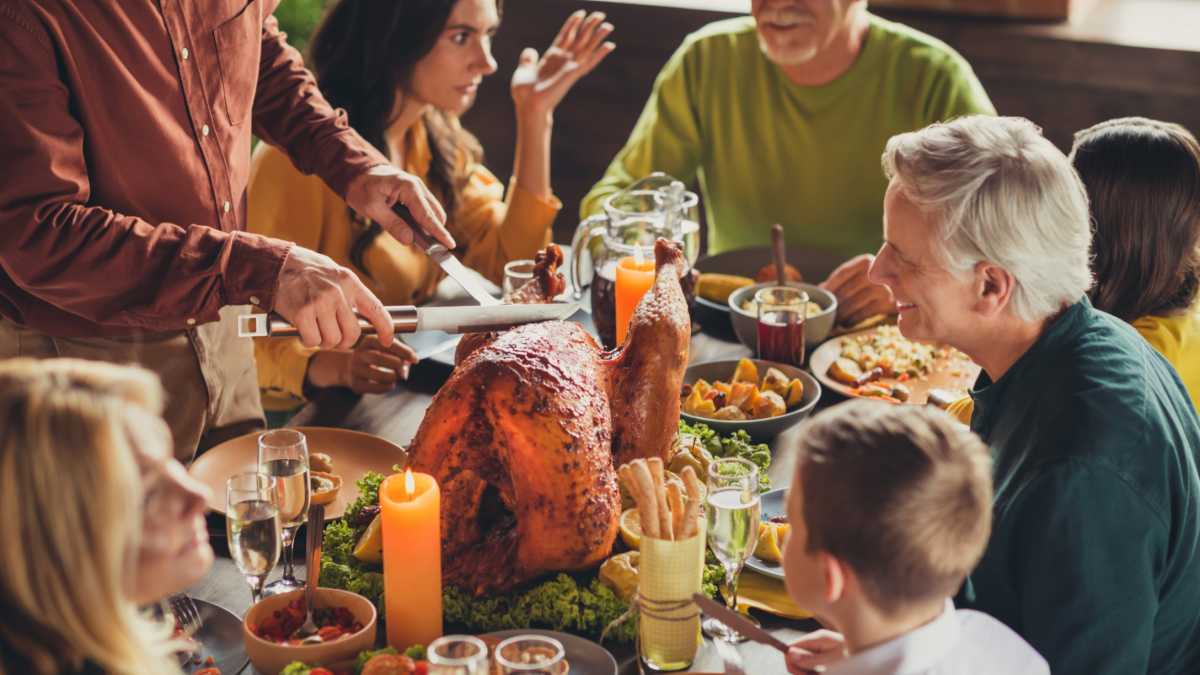1 in 3 Parents Say It's 'Worth the Risk' To Celebrate Thanksgiving With Family

With Thanksgiving just days away, the Centers for Disease Control and Prevention continues to urge Americans not to travel for the holiday, and health experts nationwide are warning that gathering with family members — even if no one is presenting COVID-19 symptoms — poses serious risks of spreading the virus exponentially. Yet according to a poll published Monday, it appears that 1 in 3 American parents feel that celebrating Thanksgiving with their families is ultimately "worth the risk."
The poll is certainly eye-opening.
After all, it's hard to deny that the pandemic is still a clear risk, particularly as coronavirus cases have continued to skyrocket in recent weeks. As of this moment, the US has surpassed 12.5 million cases and the death toll is a staggering 256,000+. But refresh the news tomorrow, and the numbers are bound to boggle the mind even more.
In short, we're in crisis mode here.
The "second wave" is inarguably upon us, as cases continue to rise in every single US state except Hawaii. As a result, hospital systems are becoming strained under the influx of new patients, everyday Americans are struggling to stay afloat because of a recent job loss, and the lines outside local food banks are wrapping around the block in towns and cities across the country.
The news that three different vaccines will soon to be coming to market is the light we've all been looking for at the end of this long, dark tunnel, but that doesn't mean that a "cure" will be here to save us tomorrow. The pandemic will still take considerable time to stop — and at the moment, it's barreling full-speed ahead like a runaway locomotive.
That's not to say that all of these parents are in denial about the risks of gathering with loved ones.
Instead, the results seem to suggest that Americans are merely pandemic weary.
Health experts say Americans are experiencing symptoms of anxiety and depression made worse by pandemic-related stressors. https://t.co/MrZC74uXSO
— NBC Nightly News with Lester Holt (@NBCNightlyNews) November 23, 2020
We're tired of Skyping with friends for "virtual happy hours" instead of meeting up for dinner and drinks. We're tired of doing Zoom calls with Grandma, Grandpa, and the kids. As the days become shorter and darker and the holidays draw near, many Americans are simply longing for something that many of us have been missing for nearly eight months now: human connection.
A recent study found that, globally, social isolation due to COVID-19 has had a negative impact on the health of senior citizens. And #Ukraine’s elderly are certainly not immune to this problem. https://t.co/BqiOMoOIoc
— KyivPost (@KyivPost) November 21, 2020
"Our report suggests that while many children have spent less time with relatives during the pandemic, some parents may have a hard time foregoing holiday gatherings in order to reduce COVID-19 risks," Sarah Clark, co-director of the C.S. Mott Children's Hospital National Poll on Children's Health at Michigan Medicine, noted in a statement given to CNN.
So, despite their concerns, one-third of parents appear to be moving ahead with their plans.
More than half of the 1,500 parents who were surveyed said they felt it was "very important" their kids were allowed to see extended family this season and continue their annual traditions. But they also said their children had remained largely isolated from these same relatives from months, indicating that safety measures have been implemented.
Clark noted that 61% of the families who said they usually celebrate Thanksgiving in person plan to do so again this year.
Many of these families are trying to play it safe.
Sixty-four percent of respondents said they would not be gathering with relatives who do not take COVID-19 precautions seriously, and only 18% of parents said they planned to involve guests who had traveled from out of state. (That said, nearly 1 million Americans passed through US airports on Friday alone, reports show — indicating that many are moving ahead with plans to see family, regardless.)
Roughly 88% of the parents polled also said they are not going to gather with any relatives or friends experiencing COVID-19-like symptoms, to help prevent the spread of the virus. (This is definitely a smart move, though it's worth noting that scientists estimate roughly 20% of coronavirus patients are asymptomatic, which means it would be impossible to tell from the outside whether they had it.)
Another 76% of parents polled said they would be consciously keeping a distance between their children and other high-risk guests, and 68% said they would enforce social distancing to limit contact. Although this, too, can certainly be helpful, the research shows that when gathering indoors, the air you breathe becomes increasingly critical — no matter how many feet apart you stand.
"Aerosols are probably the most significant transmission route. Largely in indoor, crowded & unventilated settings, and even at a two-metre distance, as the virus can spread through the air and circulate for hours"
— Jose-Luis Jimenez (@jljcolorado) November 18, 2020
By @devisridhar Chair Public Health UEhttps://t.co/cWxcfYDg6N
Experts now know that the coronavirus isn't just transmitted through droplets (which can be passed by way of coughing or spitting) but is also transmitted through aerosols, which can hang in the air for several minutes after a person talks/laughs/coughs/breathes into the surrounding air.
For these reasons (and more), experts have repeatedly urged Americans not to gather.
It's why medical experts such as Dr. Anthony Fauci and CNN's Dr. Sanjai Gupta have said they won't be gathering with family this Thanksgiving.
"You take a look at your family and you say, 'Do I have a person there who's an elderly person, a person with an underlying medical condition that might put them at an increased risk of a severe outcome if they get affected? Do I want to take that risk right now?'" Fauci told CNN's Chris Cuomo last week.
These are the questions he's begging Americans to answer now.
Doctors are also reminding us of what a "social bubble" truly is.
"People who have not been living in your household for the 14 days before you are celebrating should not be considered members of your household, and so you should take those extra precautions, even wearing masks within your own home," Erin Sauber-Schatz, lead of the CDC's Community Intervention and Critical Population Task Force, told CNN this week.
To circumvent this, many Americans are rushing to their nearest COVID-19 testing centers, in hopes of getting results before sitting down to Thanksgiving dinner. As a result, urgent care clinics and drive-thru testing facilities remain backlogged with appointments, and in some areas, residents are waiting hours just to get theirs done.
Hours at COVID-19 testing centers across Middle Tennessee have been extended because of the upcoming holiday. Click on the story below to find updated times: https://t.co/Ly721LVVst
— WSMV News4 Nashville (@WSMV) November 23, 2020
That said, some say there is a "spectrum" of risk to consider.
"There is a spectrum of people’s risk tolerance, and that is true for holidays, too," Dr. Jaimie Meyer, a Yale Medicine infectious disease specialist, shared in a recent article for Yale Medicine Online.
"To have zero risk of infection, we would need to cancel all holidays, stay home, and keep completely to ourselves," Meyer said. "For many people, that may not be the healthiest or most satisfying thing to do. But anything we do beyond that takes on some degree of risk, particularly when case levels are increasing in most places in the country, and are expected to go up as we head into the next few months."
There are also a number of added precautions people can take.
Smaller gatherings are generally considered to be safest (think: max 10 people), and isolating prior to the holiday is urged.
"If, for two weeks before the holiday, everyone can limit contact with people outside their households and avoid having kids in unsupervised settings such as playdates, sports, sleepovers, and park visits as much as possible, then you are adding a layer of safety," explained Dr. Manisha Juthani, a Yale Medicine infectious disease specialist.
Dining outdoors, if weather allows, would also be ideal, to provide maximum airflow. But if dining indoors, experts advise wearing masks as much as possible and not gathering at the dining room table for longer than you need to. Providing cross-ventilation with open windows and fans can also help, as will setting out hand sanitizer and wiping down high-contact surfaces (such as doorknobs) as much as possible.
Most of all, though, it's best to stay close to home.
When it comes to the particularly vulnerable (such as Grandma and Grandpa or those with compromised immune systems), think about whether you should sit this year out. Unless, of course, their mental health is a concern — in which case, vow to quarantine before and after the gathering.
"That way, you can hug them and maybe spend a few days with them,” Juthani shared with Yale Medicine. "But follow the lead of the older people in your life, and talk to them about what they think is best because unless you completely quarantine all members of your family, there is some potential risk."

